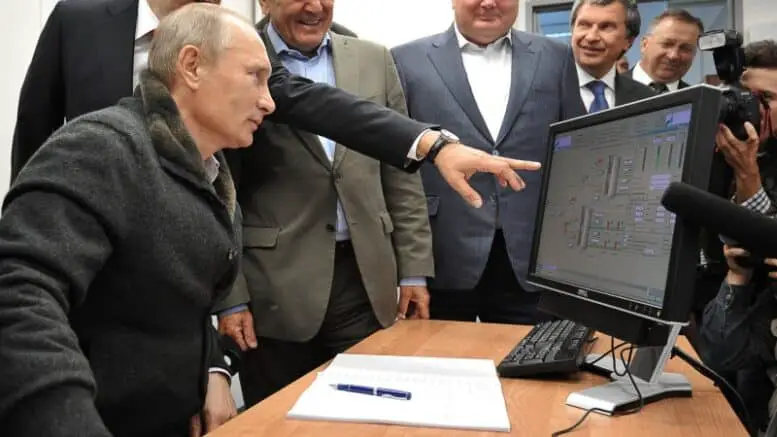Summary of a speech given
by Daniel Satinsky, B.E.A Associates

Daniel M. Satinsky, Esq.
The information technology (IT) outsourcing industry in Russia is one of the few non-natural resource sectors of the Russian economy that is actively participating in world markets on its own terms in a competitive way,” said Daniel Satinsky, Principal, B.E.A. Associates, Inc., at a 17 April 2006 lecture at the Kennan Institute.
In 2005, the estimated size of the global IT outsourcing industry was $34 billion, reported Satinsky. Activities ranging from business process outsourcing to call centers to software development are included in this figure. India dominated the industry, earning an estimated $22 billion in 2005. The Russian market, which is based almost exclusively on software development, is comparatively small at $1 billion. Yet because of its high level of human capital, Russian IT companies are building a successful track record in the global outsourcing industry.
“Russia’s IT industry is very entrepreneurial and, by and large, has grown up outside the old Soviet institutions as a new phenomenon beginning in the early 1990s,” according to Satinsky. Unlike manufacturing and energy companies, most of which were established in the Soviet Union and remain in the hands of Soviet-era managers, IT companies were built from scratch by post-Soviet entrepreneurs. During the 1990s, Satinsky explained, most of these companies were very small and strove to keep off the radar of the state and the tax police. The founders and employees were mostly academics looking for new ways to make ends meet in the struggling post-Soviet economy. By 2000, however, some of these companies had become large enough, and successful enough, that they started to take an interest in marketing and sales, thus joining the formal economy. Satinsky noted that the majority of customers for Russian IT firms are from the United States and Canada, although some European companies also outsource in Russia.
Satinsky predicted that, as an outsourcing destination, Russia would probably never surpass India or China, which have much larger populations and significantly lower average wages. Nevertheless, the Russian IT sector is projected to grow by 45 percent in 2006. Top multinationals are establishing development centers in Moscow and St. Petersburg, and as a consequence there is growing competition to attract top-level talent. Most of these development centers are an integrated part of the overall IT strategy of the respective companies, and are not aimed primarily at the Russian market itself, according to Satinsky.
Multinationals are opening these centers in response to the reputation Russian IT firms have developed for innovation and creative problem solving. Satinsky related an industry saying that suggests: “Give the urgent projects to the Americans, give the big projects to the Indians, and give the impossible ones to the Russians.” As these Russian firms build on their reputation, they are carving out a significant niche in the world market. Satinsky gave the example of Boeing, which has a development center set up in Moscow. The center has been so successful, according to Satinsky, that it has drawn protests from Seattle, as Boeing wants to shift more development work to Russia.

RUSSOFT is a major marketing alliance for the Russian IT industry
The foundation for Russia’s success in the field is the world-class science programs in its higher education system. A large number of students continue to study science—half of Russia’s higher education students major in science, a higher percentage than in China, Japan, India, Europe, or the United States. According to one World Bank study, said Satinsky, Russia has the third highest per capita concentration of scientists and engineers in the world. As long as the United States continues to experience shortages of qualified software engineers, he argued, there would be a need for outsourcing to countries such as Russia.
The $1 billion IT outsourcing industry in Russia is dwarfed by large energy companies such as Gazprom and Lukoil. While a few Russian IT companies—such as Spirit, Abbyy, and Kaspersky Labs—have been successful at selling their products on the world market, many IT product-producing companies suffer from lack of experience in management, marketing, and finance, according to Satinsky. This is in contrast to the Russian IT services companies whose level of skill in management and marketing has grown dramatically, particularly over the past five years. Russian IT entrepreneurs as a whole are rapidly gaining these skills as their companies grow and integrate into the global market.
Satinsky emphasized the importance of these nascent business leaders for Russia as a country: “The industry is not just significant in terms of what it does, but for the interaction and practical experience working with international markets that is creating the human capital necessary for Russia to play a role in technology in the world. This is a laboratory where that capital is being formed.” The skilled professionals working in this industry, concluded Satinsky, are contributing to a growing middle class within Russia and are essential for the future growth of a high tech sector in Russia: “This growth of human capital could fuel further economic growth and help transform Russia’s role in the world economy.”
The preceding was a summery of a talk given to the Kennan Institute in Washington, D.C. on April 17, 2006. Summery provided by the Kennan Institute.
For more about the industry, see RUSSOFT’s Overview of the Russian Software Market with lots of information, graphs, and statistics in a remarkably well-written document. For a full market review, RUSSOFT also offers a formal industry White Paper.




